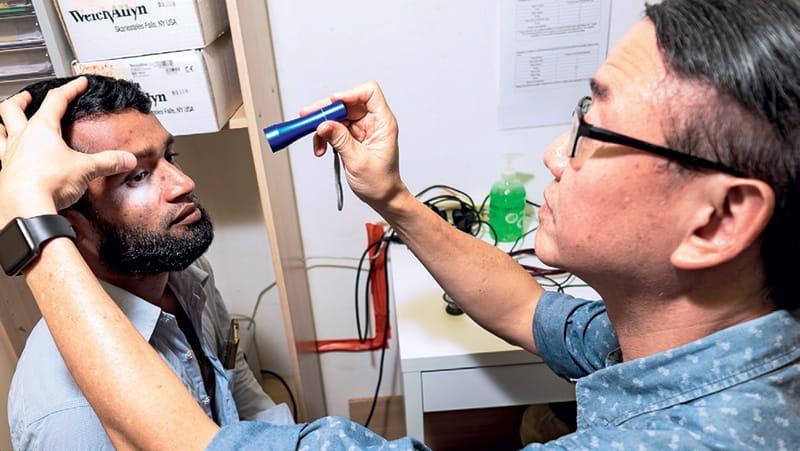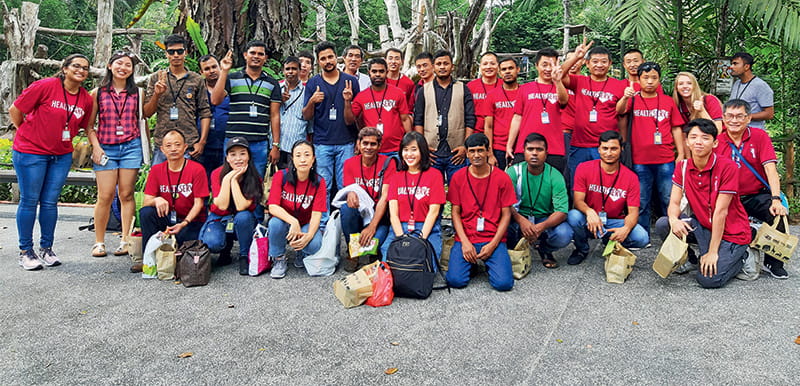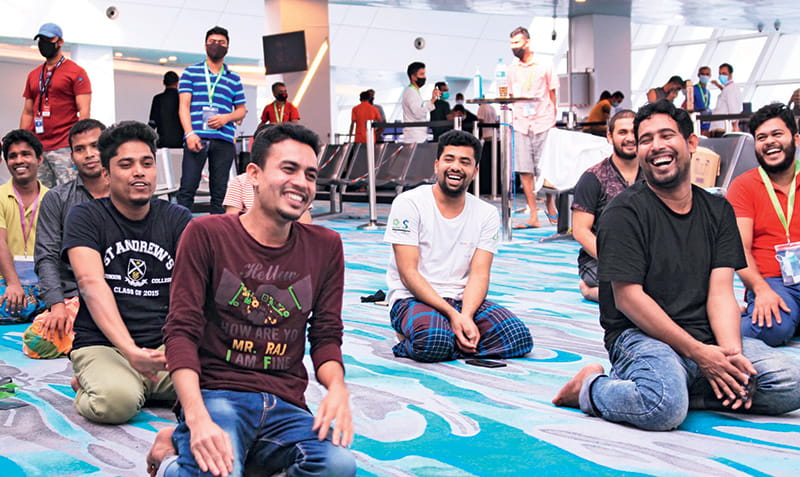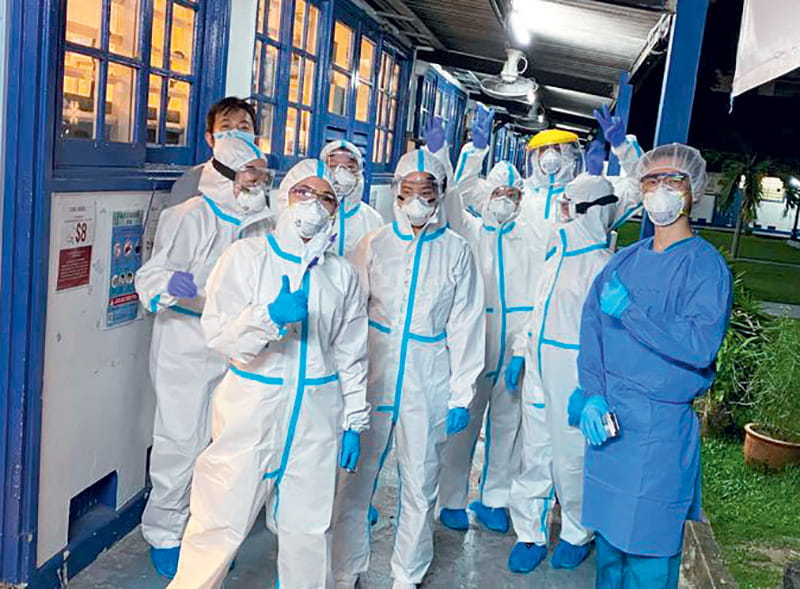Stories > Serving Humanity
Serving Humanity
A Singapore healthcare non-profit not only cares for the physical and mental well-being of migrant workers but helps to build bridges of cultural understanding.
BY TAN KENG YAO
ealthcare has to be holistic, including psychosocial, emotional and spiritual well-being.”
These were the words of Dr Goh Wei Leong, a general practitioner and the founder of HealthServe. The non-profit organisation was founded in 2006 with his friend, businessman Tang Shin Yong, especially to serve the community.
At that time, Dr Goh had recognised the vulnerability of the more than 293,000 migrants workers in Singapore – who come mainly from India, Bangladesh and China – through incurred debt.
HEALTHCARE HARDSHIPS
HealthServe focuses primarily on running clinic sessions and dental services a few evenings each week for migrant workers with no access to affordable healthcare.
While they are all entitled to healthcare by law – the cost of which should be borne by their employers – and insurance, many workers have difficulties obtaining such support. For these men, paying for their own medical care can be prohibitively expensive.
Having started as a small clinic in Geylang, where many migrant workers live, HealthServe has since opened two other clinics in Mandai and Jurong, as well as an administrative office in Little India, an enclave in central Singapore where many migrant workers gather during their free time and weekly offdays. As a registered charity, its main source of financial support are donations from individuals, foundations, corporate organisations and churches.
In addition to supporting workers with work-injury claims or employment-related issues, HealthServe also provides them with free meals and MRT card top-ups.

Dr Goh Wei Leong founded HealthServe to provide low-cost medical consultations to Singapore’s migrant workers. opposite page: The non-profit is administered by volunteers including medical professionals.
Counselling is given to workers caught in disputes with their employers – not to mention emergency shelter for those who are not allowed to work while waiting for a resolution of these disputes, the process of which may take several months to more than a year.
Dr Goh had been on several humanitarian and disaster-relief missions to India, Indonesia, Mongolia and Turkey when he decided to set up HealthServe. Having also volunteered at his friend’s dental clinic in Little India, where he attended to many migrant workers, setting up the non-profit seemed like a natural extension.
“Back then, all I wanted was to help with workers’ medical problems,” he says. “I lacked understanding on how the scope, depth and extent of a single medical problem can be so greatly intertwined with the social, emotional and spiritual well-being of the worker.
“If a worker were to fall ill at home, for instance, his wife might nurse him and cook him soup. But in Singapore, in a dormitory of 30 men who are all tired after work, there is no one to look after sick workers.”
Dr Goh’s observations also indicate that about 15 to 20 per cent of male work permit holders in Singapore suffer from moderate stress or mood and anxiety disorders. Prolonged confinement over the last few months to prevent further spread of the Covid-19 pandemic, in addition to uncertainties about their health and jobs, have further affected their mental well-being.
HIGHLIGHTING MENTAL WELLNESS
Even prior to the Covid-19 outbreak, HealthServe had been in the early stages of launching Singapore’s first comprehensive programme for mental health among migrant workers. This included work group sessions on topics such as building resilience, how to help one another manage stress and loneliness, and even plan for life upon returning to their home countries.
“The Scope, Depth And Extent Of A Single Medical Problem Can Be So Greatly Intertwined With The Social, Emotional And Spiritual Well-being Of The Workers.”
Dr Goh Wei Leong, Founder Of HealthServe
It has also partnered tertiary institutions where students reading counselling courses can put in their practicum hours with HealthServe. Workers with more severe mental distress are then referred to its panel of volunteer psychiatrists.
In April this year, the non-profit launched its virtual counselling clinic and saw over 150 migrant workers contacting it in the first two weeks alone. With the restricted movement faced by these workers – some 300,000 of whom had been quarantined in community care and recovery facilities such as Singapore Expo, Big Box, cruise ships and hotels – HealthServe continues to offer its services towards uplifting the state of migrant workers’ mental health.
Its volunteers work the ground to do a pulse check on the general sentiments of the men. They also hold group activities on cruise ships to engage the migrant worker community, while distributing treats to lift their spirits. To date, Healthcare has counselled more than 700 workers who had been feeling isolated and distressed during the Covid-19 outbreak.
BREAKING DOWN BARRIERS
On a day-to-day basis, the HealthServe team shares that interacting with migrant workers can be a challenge. Many of the Bangladeshi workers cannot speak much English, while the accent of the Chinese workers’ Mandarin is not easily understood. Besides overcoming such problems with the help of volunteer interpreters, the team has also learnt to adapt to these language barriers in subtle ways.
“I used to ask the workers whether they were allergic to any medication, while gesturing to my arms to indicate rashes. But the workers would misunderstand me, as they thought I was asking if they had skin problems,” recalls clinic intern Amanda Lee, whose duties include packing medication and handling registration and specialist referrals. She has since learnt to phrase her question more simply by asking: “All medicine can eat?”

HealthServe’s volunteer medical professionals have continued to provide healthcare services to migrant workers even during the ongoing Covid-19 pandemic despite the potential risk of infection.
Indeed, taking care of migrant workers’ needs means breaking down social and cultural barriers while building a community where they feel accepted and supported.
Over the years, HealthServe has conducted many events and activities for its workers – like outings to Sentosa and Father’s Day celebrations – in partnership with community and religious organisations as well as corporations. It also tries to dignify the everyday lives of workers through an unusual food project.
“Before Starting Out As A Case Worker, I Felt A Barrier To Approaching Them. Now, I Find Myself Smiling At Migrant Workers In The Streets Because I See Them Every Day And They Feel Familiar.”
Cheryl Tan, HealthServe Intern
Instead of running its own kitchen – which would have limited food options and created a power differential when volunteers ladle out food for the workers – HealthServe took inspiration from an initiative by local non-profit Transient Workers Count Too and pays a Geylang coffee shop for the workers’ meals. Not only does this arrangement afford the workers more autonomy, sitting at the same table and eating the same food as Singaporeans also denotes equity.
Local volunteers say they have gained a sense of familiarity with the migrant worker community through HealthServe’s efforts. “Before starting out as a case worker, I felt a barrier to approaching them,” says intern Cheryl Tan. “Now, I find myself smiling at migrant workers in the streets because I see them every day and they feel familiar.”
The migrant workers themselves have formed unlikely friendships. Chinese worker Li Jing* got to know Indian national Kumar Selvasan* during a free traditional Chinese medicine clinic. Having always had an interest in the Chinese language and excited to practise his Mandarin, Kumar attempted to start a conversation with Li. The duo continued to bump into each other at various HealthServe events and quickly became firm friends.

In addition to providing consultations for physical illnesses, HealthServe has also been organising initiatives for the migrant workers’ mental wellness to help them deal with stress and mood disorders, often a result of having to live far away from their families for prolonged periods of time.
RECIPROCATING THEIR GRATITUDE
The migrant workers – or “brothers”, as they are termed affectionately by staff and volunteers – have always been eager to give back. It was common, for instance, to see several slices of watermelons on worktables back at the Geylang clinic: tokens of appreciation from the migrant workers for the helping hand they have received.
Some would pitch in by giving haircuts to staff, interns and other workers. Yet others have offered to work alongside HealthServe volunteers amid the quarantine, by helping with crowd management, carrying out translation, and encouraging others to participate in exercise sessions at the recovery centres.
Xiao Ming*, a Chinese worker supported by HealthServe while waiting for work-injury compensation, used to tidy up the premises. He also took part in community projects like decluttering the flat of a senior citizen who had been hoarding.

Then there was Habib, a 23-year-old Bangladeshi who heard about HealthServe from his fellow workers and attended its English classes. For three times a week after his work as a landscaper, he would turn up at HealthServe’s Geylang clinic and gamely put his new skills to use by acting as an interpreter between his compatriots and the doctors.
RECOGNITION FOR SELFLESS SERVICE
The organisation’s values have drawn hundreds of volunteers who sign up to help in various capacities, from serving as doctors and medicine dispensers to working as case workers and administrators.
A video story about HealthServe and its work, which appeared on the Singapore International Foundation’s Our Better World digital storytelling portal, has also drawn interest in the organisation’s causes and, in turn, grown its rank of volunteers.
With over 590,000 views and 109 new volunteer sign-ups, the story has touched many Singaporeans who believe that non-profits such as HealthServe play an increasingly crucial role today, especially with the working and living conditions of migrant workers becoming a pressing issue.
For his work, Dr Goh was given The Straits Times Singaporean of the Year Award in 2017, which honours outstanding Singaporeans who have overcome great challenges, put the country on the world map, or made it a better place through acts of selflessness. Perhaps surprisingly for some, his plans to expand the scope of HealthServe’s work includes handing over the reins to the next generation.
“Taking Care Of Migrant Workers’ Needs Means Breaking Down Social And Cultural Barriers While Building A Community Where They Feel Accepted And Supported.”
“I’m trying to allow new leadership at the board and management level to take the organisation further because it still has a lot of potential to help many more workers,” he explains. For now, he has assumed the role of mentor, guiding interns through informal chat sessions with the aim of exchanging thoughts and ideas. “That’s something I hope to do more. More influencing, teaching and creating space for the next generation.”
*Real names have been withheld.

Scan the QR code or visit
www.ourbetterworld.org/story/
friend-life-and-death to find out
more.
